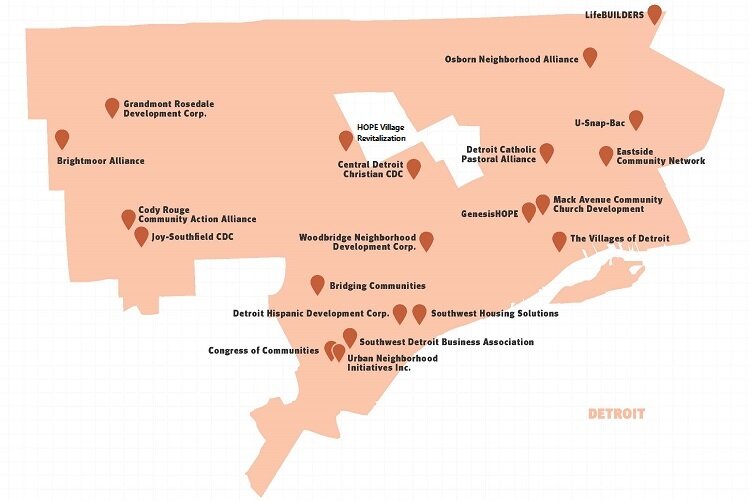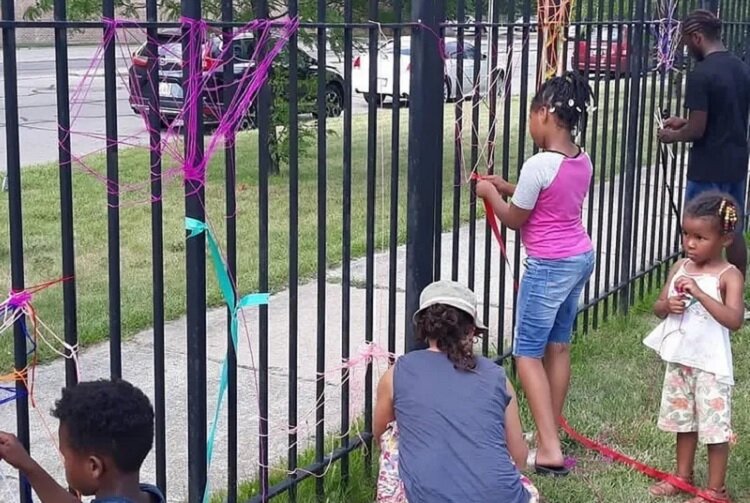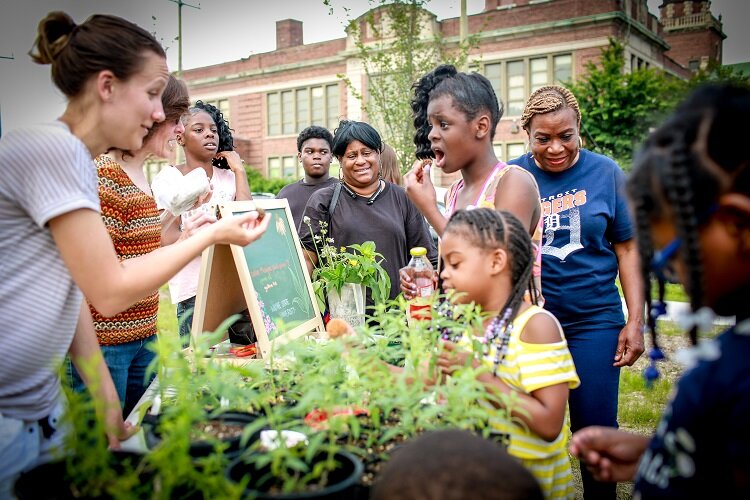Resilient Neighborhoods: Why these 21 Detroit CDOs are taking a stand on police brutality
A coalition of Detroit community development organizations is calling for dramatic changes in how neighborhood residents interact with law enforcement. And in doing so, they're rethinking what it means to be a CDO in Detroit.
For Matthew “Jaye” Green, the Memorial Day death of George Floyd in Minnesota hit close to home.
The 26-year-old artist and community organizer, who lives on Detroit’s east side, considers what happened to Floyd, who died while handcuffed after a police officer knelt on his kneck for nearly nine minutes, to be an act of unjustifiable murder.
Green says he has experienced negative interactions with law enforcement officers ever since the time he was a teenager, especially during a two-and-a-half-year period when he attended high school in West Bloomfield. And he worries about the possibility of himself or other young African American men and women he knows becoming victims of police brutality.
“I’m very concerned,” he says. “I used to get stopped, harassed, chased, guns pulled out on me, multiple times. All it takes the wrong twitch, the wrong whatever, and lives are lost.”
Green supports the Black Lives Matter movement and feels comprehensive change is needed to curb police brutality.
Tammara Howard, 50, resides in the east-side neighborhood of Gratiot Woods, where she runs two community-oriented nonprofits, What About Us, Inc. and Belvidere Community Youth Block Club. She finds episodes like what happened to Floyd to be reprehensible. But Howard is also mindful of her own experiences with local law enforcement officers that on the whole have been quite positive.
“I just hate that it’s happening,” she says, “because I know in my neighborhood we have police. And they’re real nice and real active in the community.”
For Howard, police brutality is largely an issue of individual misconduct, which should be remedied by police departments adopting measures like new sensitivity training programs.
CDOs and social justice
Although they view the issue somewhat differently, both Green and Howard have a close relationship with a community development organization, Eastside Community Network (ECN), that’s taken its own stance on police-community relations.
“The murder of George Floyd has snatched the last sheet of excuse covering the racist reality of oppression of African Americans at the hands of police in a way that no amount of preaching, teaching or workshopping could achieve. All of America is now forced to look and then to take a stand.”
Green is employed by ECN as a community engagement coordinator and Howard works with them frequently as a resident and nonprofit operator.
CDOs are not-for-profit groups focused on offering programs and services that encourage and support community development. Formerly known as the Warren-Conner Development Coalition, ECN supports commercial developments like Mack-Alter Square, spearheaded the community-driven Lower Eastside Action Plan, and also sponsors youth programming.
While community development organizations like Eastside Community Network don’t typically weigh in on issues like police brutality, the nonprofit recently did just that in an open letter released as part of an coalition of Motor City community development organizations called the Detroit 21, which is composed of the directors of 21 Detroit CDOs.
After hearing about Floyd’s death and then watching the response of local law enforcement authorities to protesters calling for justice, the Detroit 21 felt compelled to address the issue of police-community relations head-on.
Following a spirited discussion, the leadership of The Detroit 21 decided to take a public stance with their statement, “An open letter from community leaders: A vision of resiliency where police violence is not tolerated.” Among other things, it calls for a demilitarization of police and support for protesters exercising their democratic right to free speech.
Comparing Floyd’s death with the 1963 Birmingham church bombing, the murders of Black Panthers Mark Clark and Fred Hampton, and the fatal shooting of Trayvon Martin, the document reads like a manifesto, lauding the young protesters who have taken the streets since late May to oppose police brutality.
“There are moments in history that cause things to change …Today we live in another such moment,” the letter begins. “The murder of George Floyd has snatched the last sheet of excuse covering the racist reality of oppression of African Americans at the hands of police in a way that no amount of preaching, teaching or workshopping could achieve. All of America is now forced to look and then to take a stand.”
It condemns excessive violence by law enforcement, specifically by police and Immigration and Customs Enforcement (ICE) officers, noting that this type of violence is protected by “special rules” and far too often results in the “death and dismemberment of people of color.” From there, the statement outlines a vision of a “resilient community” and declares the coalition’s intention to “join with and accept the leadership of our youth” in transforming institutions to be more receptive to community needs.
For Donna Givens, president and CEO of the Eastside Community Network, signing off on the statement and its vision took some soul-searching. In the community her organization services — an area that falls roughly between I-94, the Detroit River, Mount Elliott Street, and Alter Road on Detroit’s lower east side — residents often complain about the lack of police presence. But, while thinking it over, two memories resurfaced. The first was giving a talk on police reform and hearing some young African American men talk about incidents of police threatening their fathers and question whether reform was even possible. The second was listening to a Hispanic man on Detroit’s southwest side read a poem about how Latinx people in his neighborhood, both documented and undocumented, were terrified of having to deal ICE agents.
“We took a moral stance,” says Givens of the open letter. “We can trace problems with the police all the way back to slavery, and we can look and see the correlation to what is happening to Black people and to Hispanic people and other immigrant populations and understand that this is simply wrong.”
Protest and resiliency
It’s fitting that the task of drafting their call for justice fell to Rev. Larry Simmons, pastor of Baber Memorial A.M.E. Church and leader of the Brightmoor Alliance.
As a teenager, he dedicated his life to fighting injustice after learning about the white nationalist bombing of the 16th Street
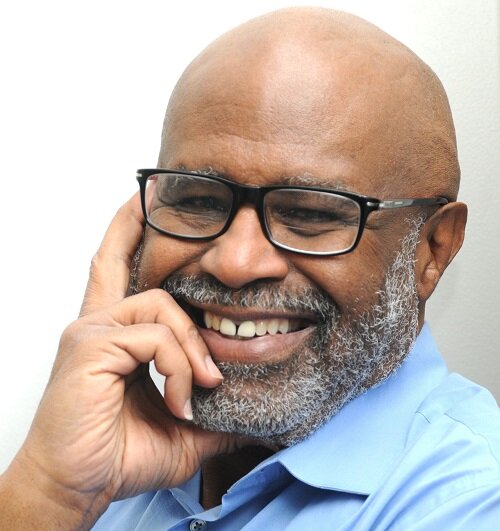
Baptist Church in Birmingham, Alabama, which killed four African-American girls. That commitment led him to become active with the Black Power and Vietnam Peace Movements of that era. Later he served as a political director for Coleman Young and played a role in numerous other political campaigns. In 1992, he followed the call into ministry, and through his church’s urban agriculture efforts in northwest Detroit he became involved with the Brightmoor Alliance, of which he is now executive director.
Simmons’ involvement with the Detroit 21, as with others in the coalition, initially took place through a Kresge Foundation grant project that brought together different Detroit CDOs. Over time, the leaders began to get to know one another and develop their own collective identity.
When Simmons heard about the murder of George Floyd, he felt a moral imperative to respond to his death and the larger issues it raised.
“This was naked cruelty that needed to be spoken to,” says Simmons. “And seeing the courage of our young people, the articulation of their outrage and vision, we felt as elders — most of us are older — that needed to be said to those of our era and to people in positions of power.”
In addition to simply demanding greater accountability by the police, The Detroit 21 has endeavored to create a framework that can channel the energy of today’s street protests into a longer-term vision. What they came up with was a concept they call “Resilient Community” that marks a departure from traditional notions that CDOs are solely focused on commercial and housing development.
The Resilient Communities framework is a holistic approach to addressing, not just at police-community relations, but any issue in a way that respects and serves community interests. It rests on six foundations: People, Systems Thinking, Adaptability, Transformability, Sustainability, and Courage.
According to Simmons, working toward a Resilient Community will involve a rethinking of how communities address public safety that takes into account issues like racial bias. Beyond that, he feels new structures need to oversee police and ensure their accountability to community residents. And for this to happen in a meaningful way, he insists that young people have to have a leadership role in the dialogue.
“They can’t just be consulted,” he says. “They have to be sitting at the design table, the implementation table, the management and control table. And once that’s done and the sustaining structures are created, they’ve got to be intimately involved in setting the agenda and evaluating what’s going on.”
Sustainable futures
While Simmons acknowledges their vision of Resilient Communities is still a work in progress, he feels some progress is being made. In fact, he considers the establishment of The Detroit 21 as a good early step forward.
“We haven’t always been partners together. We’ve been competitors. We’ve competed for the same grants, the same
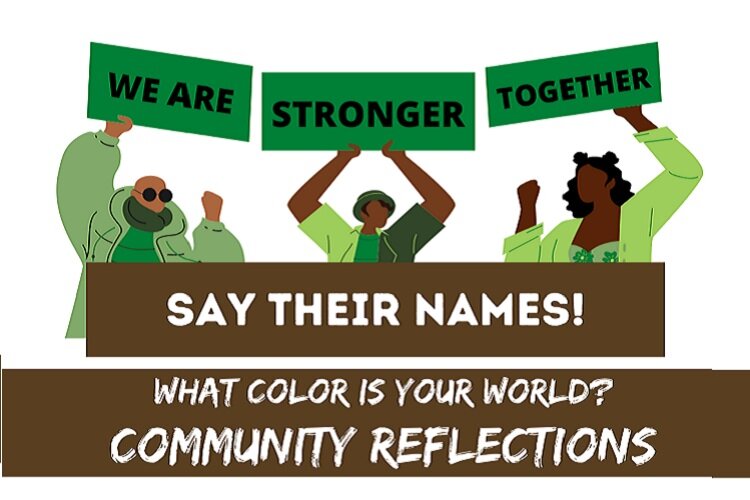
opportunities with foundations and the government. [Now] we now sit at the table.”
An example is how the Brightmoor Alliance is working with their northwest Detroit neighbors Grandmont Rosedale to develop the grounds of a former school that borders both their service areas.
“This would not have happened 10 years ago,” says Simmons. “We would have competed for whatever money would have been available for the renovation. Now we’re going to work together on this.”
For Debbie Fisher, director of HOPE Village Revitalization, the principles outlined in The Detroit 21’s open letter resonate well

with the work being done by her CDO.
Originally a project of Focus: HOPE, Hope Village Revitalization is now an independent nonprofit that services a 100-block area near Oakman Boulevard and Linwood Street.
Reflecting on the parallels between Hope Village Revitalization’s efforts and the Resilient Community framework, Fisher remarks on her group’s emphasis on sustainable equitable development and community decision-making; the CDOs headquarters and housing projects make strong use of solar energy and its 12-member governing board is made up entirely of community residents and stakeholders. Beyond that, the organization is keenly aware of the importance of systems thinking in understanding community issues.
“We’ve always recognized that the challenges we face in our community are not an accident but the product of long-term systemic racism and disinvestment,” says Fisher.
As for The Detroit 21’s demands for police accountability, she hopes their open letter will serve as a much-needed wake-up call.
“The militarization of the police has no place in the world we’re envisioning and peaceful protest is not only accepted, it’s encouraged,” she says.”It’s a critique not just of community-police relations but of ourselves and our society. It goes beyond that to say all of these policies and practices need to be examined.”
Resilient Neighborhoods is a reporting and engagement series that examines how Detroit residents and community development organizations are working together to strengthen local neighborhoods. It’s made possible with funding from the Kresge Foundation.
